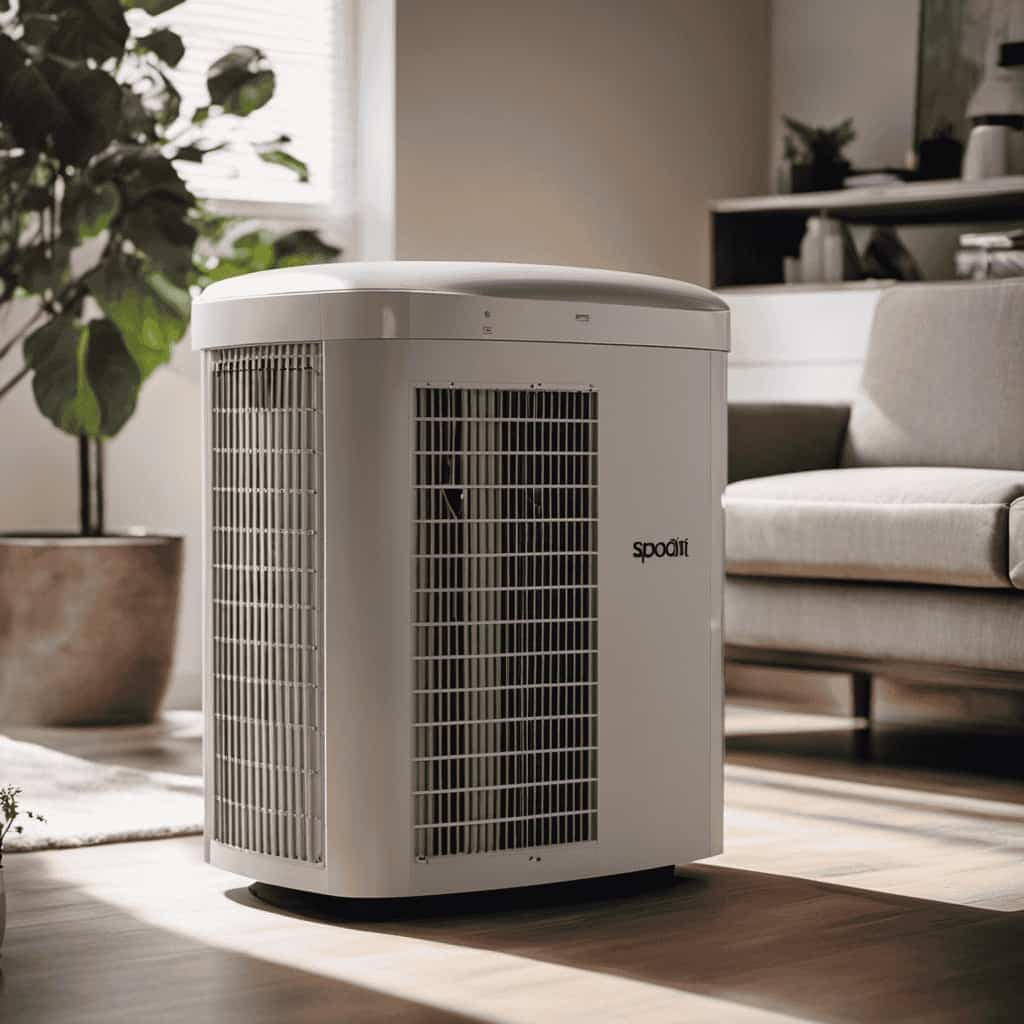Proper oil management in scroll compressors involves selecting high-quality synthetic oils with the right viscosity, regularly checking oil levels, and ensuring filters are clean. Monitor oil temperature and replace oil before contamination or viscosity issues develop. Maintaining a clean environment and following manufacturer guidelines helps prevent common problems like sludge or debris buildup. If you keep these practices in mind, you’ll optimize performance and extend your compressor’s life—learn more about effective oil strategies below.
Key Takeaways
- Regularly monitor oil levels and quality using sight glasses or dipsticks to ensure proper lubrication.
- Use high-quality synthetic oils compatible with the compressor’s specifications for optimal performance.
- Maintain effective filtration systems to remove dirt, debris, and oxidation byproducts, preventing contamination.
- Schedule timely oil changes and filter replacements to minimize contamination buildup and maintain oil efficacy.
- Keep the compressor environment clean and ensure proper cooling to prevent oil degradation and temperature-related issues.
Importance of Proper Lubrication in Scroll Compressors
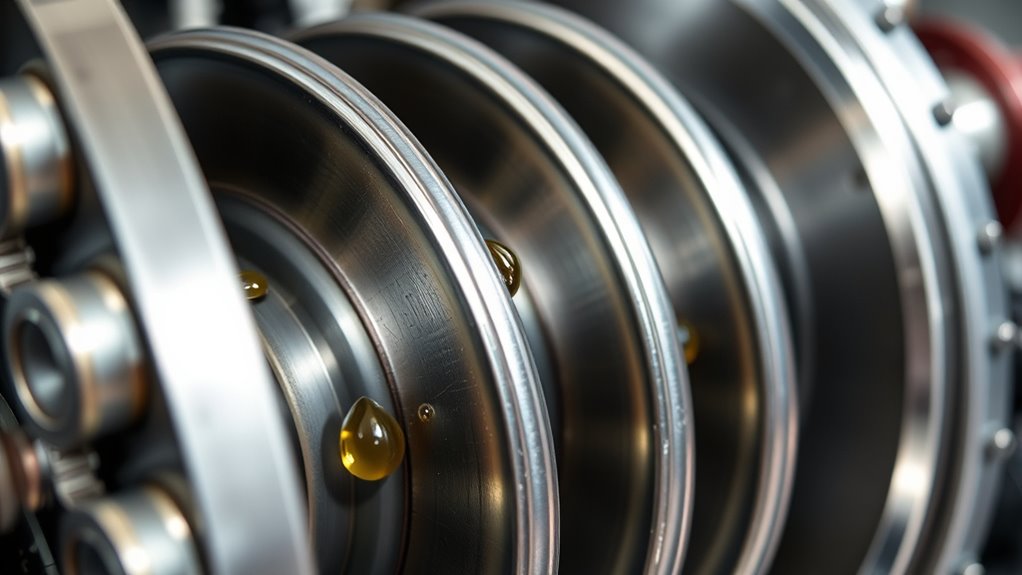
Why is proper lubrication crucial for scroll compressors? It ensures smooth operation and prevents premature wear. Using the correct lubrication techniques, you reduce friction between moving parts, extending the compressor’s lifespan. Proper lubrication also helps maintain peak efficiency by minimizing energy loss. However, oil contamination can pose serious issues, such as clogging filters or damaging internal components. Contaminants like dirt, moisture, or debris can compromise lubrication quality, leading to increased wear and risk of failure. Regularly monitoring oil quality and applying suitable lubrication techniques are essential to avoid these problems. Additionally, understanding the types of filters used in oil systems can help prevent contamination issues. When lubrication is maintained properly, your scroll compressor runs reliably, stays efficient, and requires fewer repairs, saving you both time and money in the long run.
Selecting the Right Oil for Optimal Performance
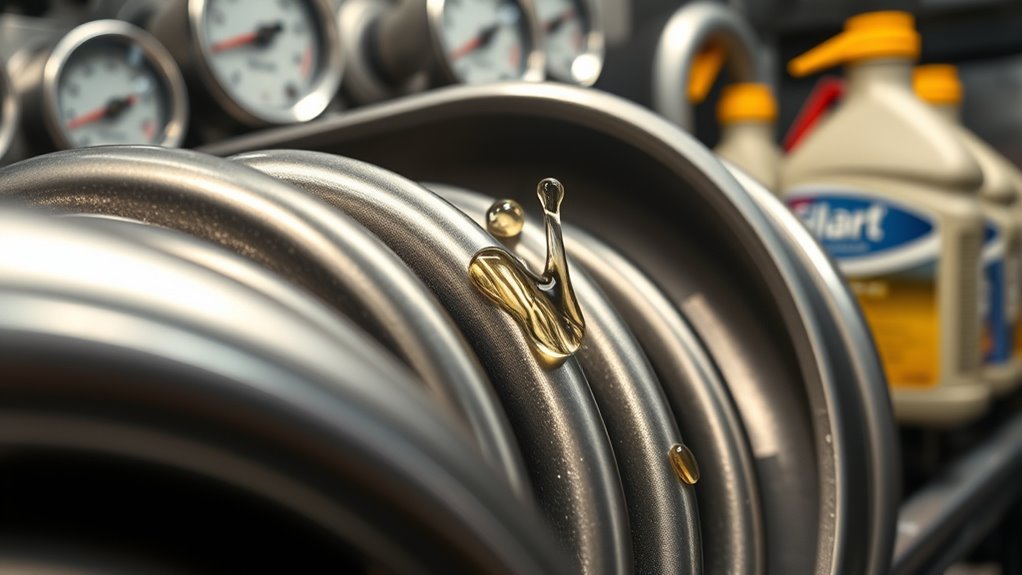
Choosing the right oil for your scroll compressor is essential to guarantee best performance and longevity. Synthetic oils often outperform conventional options by providing better thermal stability, reducing wear, and resisting breakdown under high temperatures. When selecting oil, consider its viscosity and compatibility with your compressor’s materials. High-quality synthetic oils also facilitate superior oil filtration, helping remove contaminants that can cause damage or inefficiency. Proper filtration ensures that dirt, debris, and oxidation byproducts don’t circulate within the system, maintaining cleaner operation and extending oil life. Always follow manufacturer recommendations for oil type and specifications. Using the correct synthetic oil combined with effective oil filtration helps maximize compressor efficiency, reduce downtime, and prolong equipment life.
Monitoring and Maintaining Oil Levels
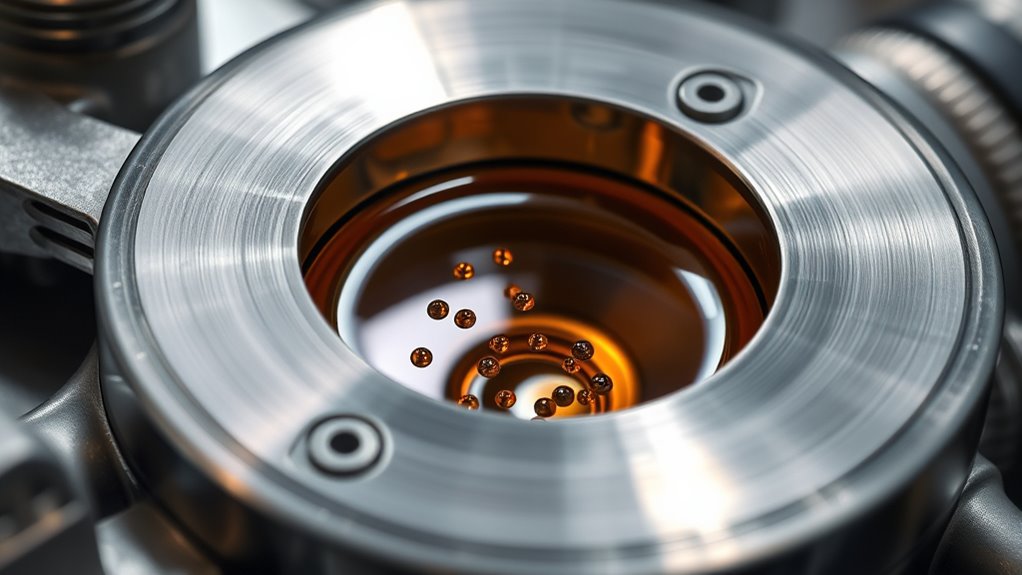
Regularly monitoring and maintaining the oil level in your scroll compressor is crucial for peak performance and preventing damage. Check the oil level frequently using the sight glass or dipstick, ensuring it stays within the recommended range. Proper oil filtration is essential to remove contaminants that can impair lubrication, so keep filters clean and replace them as needed. Keep an eye on oil temperature; excessive heat can degrade oil quality and cause breakdowns. Use temperature sensors or gauges to track oil heat, and ensure cooling systems are functioning properly. Maintaining ideal oil levels, filtering effectively, and controlling oil temperature help minimize wear and extend your compressor’s lifespan. Consistent monitoring allows you to catch issues early, keeping your equipment running smoothly.
Common Oil-Related Issues and Troubleshooting

Even when you keep a close eye on oil levels and maintain proper filtration, issues related to oil can still arise. Oil contamination is a common problem that can lead to reduced compressor efficiency and increased wear. Contaminants like dirt, moisture, or debris can enter the system, compromising oil quality. Viscosity issues also pose challenges; oil that’s too thick or too thin affects lubrication and heat transfer. If oil viscosity is inconsistent, you might notice increased noise, higher energy consumption, or premature component wear. Troubleshooting these issues involves checking for signs of contamination, replacing or filtering oil, and ensuring the oil’s viscosity matches manufacturer specifications. Addressing these problems promptly helps extend your compressor’s lifespan and maintains *ideal* performance. Regular oil management practices can further prevent such issues and optimize compressor operation.
Best Practices for Oil Management and Longevity
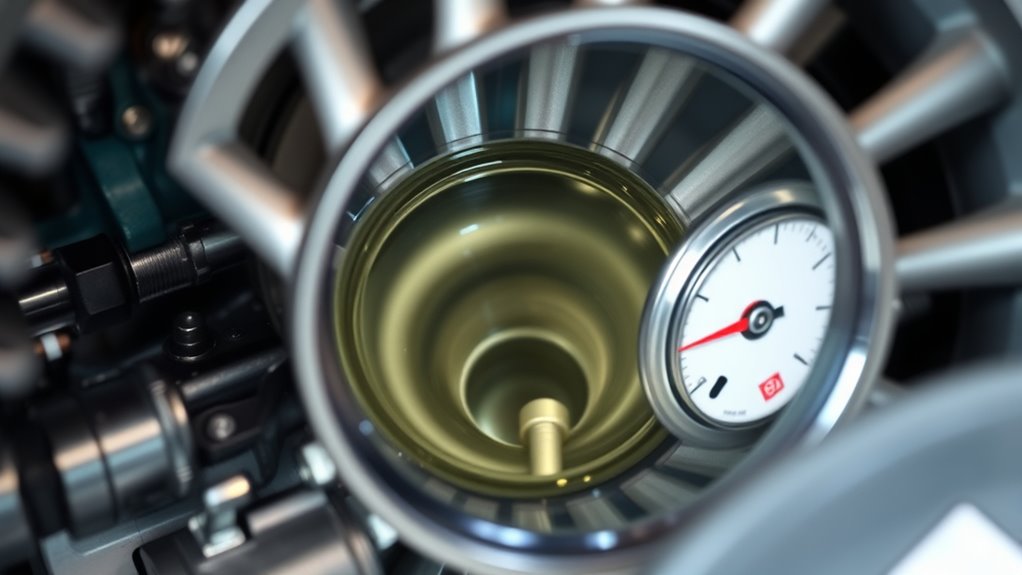
To maximize the lifespan and performance of your scroll compressor, implementing effective oil management practices is essential. Regularly monitor oil levels and change oil before contamination becomes an issue. Keep an eye out for signs of oil contamination, like sludge or abnormal wear, and address them promptly. Practice oil recycling by properly filtering used oil to remove debris and contaminants, extending oil life and reducing waste. Use high-quality oils suited for your compressor’s specifications to prevent breakdowns. Maintaining a clean environment around the compressor also helps minimize dirt and debris that can contaminate the oil. Consistent oil management reduces wear, prevents costly repairs, and guarantees ideal operation over time. Staying proactive with oil care directly contributes to your compressor’s longevity and efficiency. Additionally, staying informed about advancements in automated systems can help optimize your maintenance routines and improve overall system reliability.
Frequently Asked Questions
How Does Oil Viscosity Affect Scroll Compressor Performance?
You might wonder how oil viscosity impacts your compressor’s performance. Higher oil viscosity can improve lubrication but may increase resistance, reducing compressor efficiency. Conversely, low viscosity oils flow easily but might not provide enough lubrication, leading to wear and inefficiency. Finding the right balance guarantees your scroll compressor operates smoothly, maintains ideal efficiency, and minimizes wear. Proper oil viscosity selection is vital for reliable, efficient, and long-lasting compressor operation.
What Are the Environmental Impacts of Scroll Compressor Oil Disposal?
Like an oil spill in the ocean, improper disposal of scroll compressor oil can harm the environment. You should prioritize recycling methods to minimize pollution, as discarded oil can contaminate soil and waterways, affecting wildlife and human health. By responsibly managing oil disposal, you help prevent environmental damage, much like cleaning up a spill. Your actions ensure cleaner air, water, and land, safeguarding the planet for future generations.
Can Synthetic Oils Extend the Lifespan of Scroll Compressors?
Synthetic oils offer several advantages that can extend the lifespan of scroll compressors. Their superior chemical stability and better lubrication properties reduce wear and tear, leading to longer-lasting components. By using synthetic oils, you benefit from enhanced oil lifespan extension, which means less frequent oil changes and improved overall efficiency. These oils also perform better under high temperatures, helping to maintain ideal compressor performance and prolong its operational life.
How Often Should Oil Filters Be Replaced in Scroll Systems?
For ideal performance, you should prioritize oil filter maintenance by replacing filters at recommended intervals, typically every 3 to 6 months, depending on usage and manufacturer guidelines. Regular replacement ensures contaminants don’t circulate through your system, preventing damage. Always monitor system performance and consult your compressor’s manual for specific replacement intervals. Consistent oil filter maintenance helps extend your compressor’s lifespan and maintains efficient operation.
What Are the Signs of Oil Contamination in Compressor Operations?
Sometimes, subtle changes hint at underlying issues. When monitoring your compressor, look for contamination indicators like unusual oil color, increased viscosity, or foaming. Regular oil analysis reveals hidden signs of contamination, helping you catch problems early. If you notice these signs, it’s time to investigate further. Properly addressing contamination indicators guarantees your compressor runs smoothly, preventing costly downtime and extending its lifespan.
Conclusion
By mastering oil management in scroll compressors, you guarantee they run smoother than a symphony. Proper lubrication, vigilant monitoring, and timely troubleshooting protect your equipment from catastrophic failures and extend its lifespan beyond what you’d think possible. Remember, neglecting oil can turn your compressor into a ticking time bomb. Stay diligent, follow best practices, and treat your compressor’s oil like gold—because in this game, precision and care can mean the difference between excellence and disaster.




